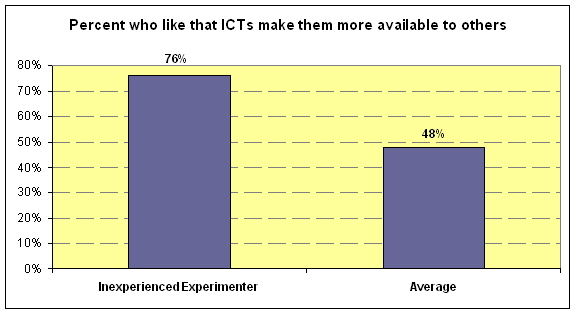With lower-than-average technology assets, ICTs have less of an impact on Inexperienced Experimenters. Yet they like how ICTs connect them to other and some have tried Web 2.0 applications.
This group is below average when it comes to having some information technologies (namely broadband access) and understandably it does less with fewer services and technologies at hand. They are fairly infrequent online users and modern information technology does not loom very large in their daily lives. Thus, not many say they would have a hard time giving up ICTs.
But there are some cross currents in their attitudes toward and use of ICTs. Members of this group like the fact that ICTs make them more available to others. Most herald gadgets’ capacity for helping them to be more productive. At the same time, most need help to get their various gadgets to work and they more likely than average to find ICTs intrusions annoying, Nonetheless, some in this group have tried the interactive Web, either through posting a comment online or emailing a photo. This suggests that, with more resources and experience, members of this group might use ICTs more intensely.
This openness to trying cutting-edge applications and satisfaction with information technology – combined with the relatively few years of online tenure – inspires this group’s name. They are the Inexperienced Experimenters – fairly new to the internet, but ready to give it a go.
Assets
Although Inexperienced Experimenters members are above the average in terms of internet penetration (82%) and cell phone adoption (85%), and they are not very likely to have broadband at home (15%). Most have desktop computers and laptops (73%), but just one quarter (24%) have laptop computers. They fall just short of the average with respect to digital cameras (52%) and video cameras (41%). Finally, their cell phones tend not to have many features; Inexperienced Experimenters’ cell phones are half as likely as average to be able to surf the internet, play music, or take or record video.
Activities
About half (51%) of internet users in this go online on the typical day and few use the internet frequently either at home or work. Just 9% say they log on several times a day at home, and 25% say this about logging on at the work; both figures are below the norm. Only 12% log on just to pass the time or for fun on the average day – less than half the average. Inexperienced Experimenters are more involved with traditional media than tech-oriented Americans; they are more likely to watch TV on the average day and watch an average of about a half hour more TV on the typical day than the tech-oriented groups.
Still in the early adoption phase for ICTs, some in this group may mature into active participants in cyberspace.
Still, one in five (19%) Inexperienced Experimenters has tried at least one of the six activities pertaining to user-generated content. The occasional comment to a blog or online community is not out of the question for this group. Among those who take digital photos, 49% will share them through email. Among Inexperienced Experimenter game players (29% of the group), some 12% will play with others over the internet.
Attitudes
Inexperienced Experimenters have generally very positive attitudes toward information technology, especially with respect to personal productivity and keeping in touch with others. More than half (54%) of Inexperienced Experimenters say ICTs help them be more productive, well above the 33% average. Two-thirds (65%) say ICTs help a lot in staying in touch with family and friends. Three-quarters (76%) like how information technology makes them more available to others (the average is 48%).

At the same time, most (83%) suspect that their information appliances can do more and most (64%) also need help getting new gadgets to function properly. Thus, notwithstanding the fact that they like ICTs’ connective benefits, some 38% find dealing with gadgets stressful – more than twice the average.
Inexperienced Experimenters also see information goods and services as a knowledge-building tool and, for some, as a way to cultivate their creative sides. Fully 61% say information technology helps them a lot to learn new things, 32% says it helps a lot in how they pursue hobbies, and 35% says it helps them share their ideas and creations with others. All these figures exceed the average.
Demographics
The median age is 50 for Inexperienced Experimenters. But they do not have a wealth of online experience, as the typical member of this group has 5 years of online tenure. It is mostly female – 61% – and it is not a group slightly above average with respect to income and levels of educational attainment. This group comprises 8% of the general population.
In a typology such as this, one might expect to find one or more segments of the population with lower incomes to have less information technology, perhaps less experience with it, and few positive perspectives about information technology. The final two groups in the typology are those segments, but they differ in rates of cell phone access, as well as attitudes toward technology.


